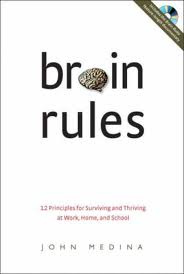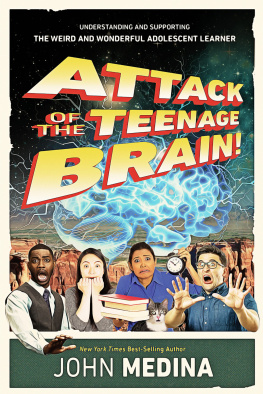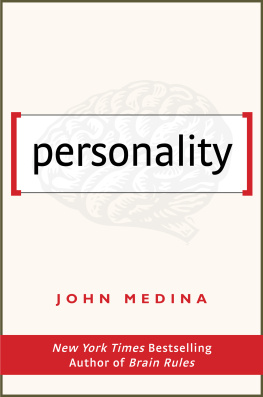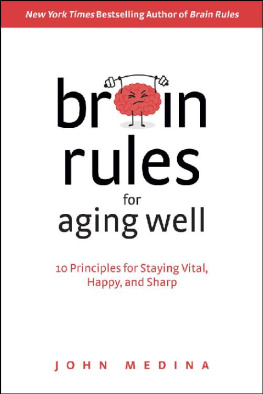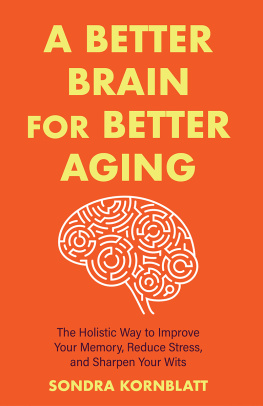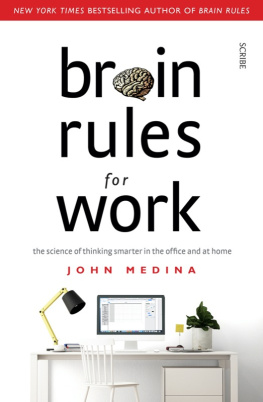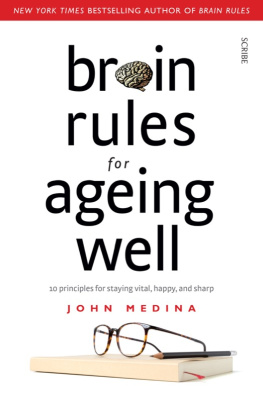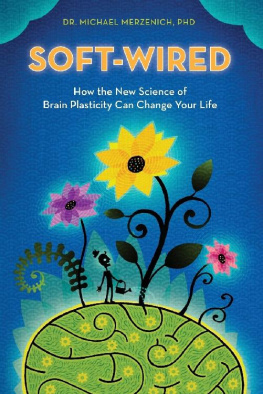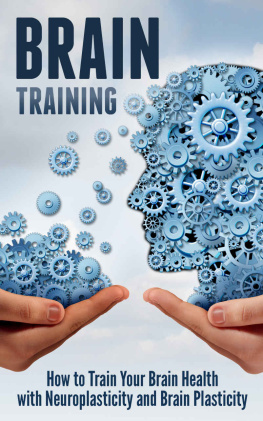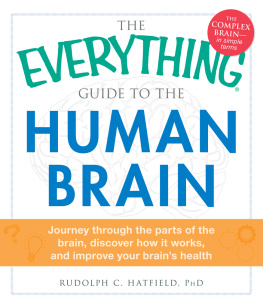
John Medina is a developmental molecular biologist and research consultant. He is an affiliate Professor of Bioengineering at the University of Washington School of Medicine.
He is also the director of the Brain Center for Applied Learning Research at Seattle Pacific University. He lives in Seattle, Washington.
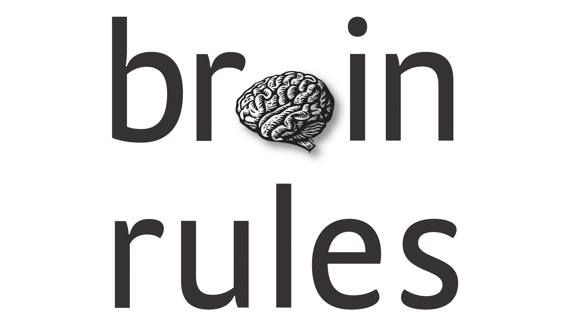


BRAIN RULES. Copyright 2008 by John J. Medina.
All rights reserved. Printed in the United States of America.
No part of this book may be used or reproduced in any manner whatsoever without written permission except in the case of brief quotations embodied in critical articles or reviews.
Requests for permission should be addressed to: Pear Press
P.O. Box 70525
Seattle, WA 98127-0525
U.S.A.
This book may be purchased for educational, business, or sales promotional use. For information, please visit www.pearpress.com.
First Pear Press trade paperback edition 2009
Edited by Tracy Cutchlow
Designed by Greg Pearson
Library of Congress Cataloging-In-Publication Data is available upon request.
ISBN-10: 0-9797777-4-7
ISBN-13: 978-0-9797777-4-5
10 9 8 7 6 5 4 3 2 1
To Joshua and Noah
Gratitude, my dear boys, for constantly reminding methat age is not something that matters unless you are cheese.
contents
introduction
1
Rule #1: Exercise boosts brain power.
Our brains love motion ~ The incredible test-score booster ~ Will you age likeJim or like Frank? ~ How oxygen builds roads for the brain survival
Rule #2: The human brain evolved, too.
Whats uniquely human about us ~ A brilliant survival strategy ~ Meet yourbrain ~ How we conquered the world
wiring
Rule #3: Every brain is wired differently.
Neurons slide, slither, and split ~ Experience makes the difference ~ Furiousbrain development not once, but twice ~ The Jennifer Aniston neuron attention
Rule #4: We dont pay attention to boring things.
Emotion matters ~ Why there is no such thing as multitasking ~ We pay greatattention to threats, sex, and pattern matching ~ The brain needs a break!
short-term memory
Rule #5: Repeat to remember.
Memories are volatile ~ How details become splattered across the insides of ourbrains ~ How the brain pieces them back together again ~ Where memories go long-term memory
Rule #6: Remember to repeat.
If you dont repeat this within 30 seconds, youll forget it ~ Spaced repetitioncycles are key to remembering ~ When floating in water could help your memory sleep
Rule #7: Sleep well, think well.
The brain doesnt sleep to rest ~ Two armies at war in your head ~ How toimprove your performance 34 percent in 26 minutes ~ Which bird are you? ~
Sleep on it!
stress
Rule #8: Stressed brains dont learn the same way.
Stress is good, stress is bad ~ A villain and a hero in the toxic-stress battle ~ Whythe home matters to the workplace ~ Marriage intervention for happy couples sensory integration
Rule #9: Stimulate more of the senses.
Lessons from a nightclub ~ How and why all of our senses work together ~
Multisensory learning means better remembering ~ Whats that smell?
vision
Rule #10: Vision trumps all other senses.
Playing tricks on wine tasters ~ You see what your brain wants to see, and itlikes to make stuff up ~ Throw out your PowerPoint gender
Rule #11: Male and female brains are different.
Sexing humans ~ The difference between little girl best friends and little boy bestfriends ~ Men favor gist when stressed; women favor details ~ A forgetting drug exploration
Rule #12: We are powerful and natural explorers.
Babies are great scientists ~ Exploration is aggressive ~ Monkey see, monkey do
~ Curiosity is everything
acknowledgements
283
index
introduction
go ahead and multiply the number 8,388,628 x 2 in your head.
Can you do it in a few seconds? There is a young man who can double that number 24 times in the space of a few seconds. He gets it right every time. There is a boy who can tell you the precise time of day at any moment, even in his sleep. There is a girl who can correctly determine the exact dimensions of an object 20 feet away. There is a child who at age 6 drew such lifelike and powerful pictures, she got her own show at a gallery on Madison Avenue. Yet none of these children could be taught to tie their shoes. Indeed, none of them have an IQ greater than 50.
The brain is an amazing thing.
Your brain may not be nearly so odd, but it is no less extraordinary. Easily the most sophisticated information-transfer system on Earth, your brain is fully capable of taking the little black squiggles on this piece of bleached wood and deriving meaning from them. To accomplish this miracle, your brain sends jolts of electricity crackling through hundreds of miles of wires composed of brain cells so small that thousands of them could fit into the period at the end of this sentence. You accomplish all of this in less time than it takes you to blink. Indeed, you have just done it. Whats equally incredible, given our intimate association with it, is this: Most of us have no idea how our brain works.
This has strange consequences. We try to talk on our cell phones and drive at the same time, even though it is literally impossible for our brains to multitask when it comes to paying attention. We have created high-stress office environments, even though a stressed brain is significantly less productive. Our schools are designed so that most real learning has to occur at home. This would be funny if it werent so harmful. Blame it on the fact that brain scientists rarely have a conversation with teachers and business professionals, education majors and accountants, superintendents and CEOs. Unless you have the Journal of Neuroscience sitting on your coffee table, youre out of the loop.
This book is meant to get you into the loop.
12 brain rules
My goal is to introduce you to 12 things we know about how the brain works. I call these Brain Rules. For each rule, I present the science and then offer ideas for investigating how the rule might apply to our daily lives, especially at work and school. The brain is complex, and I am taking only slivers of information from each subjectnot comprehensive but, I hope, accessible. The Brain Rules film, available at www.brainrules.net/dvd, is an integral part of the project. You might use the DVD as an introduction, and then jump between a chapter in the book and the illustrations online. A sampling of the ideas youll encounter:
For starters, we are not used to sitting at a desk for eight hours a day. From an evolutionary perspective, our brains developed while working out, walking as many as 12 miles a day. The brain still craves that experience, especially in sedentary populations like our own. Thats why exercise boosts brain power (Brain Rule #1) in such populations. Exercisers outperform couch potatoes in long-term memory, reasoning, attention, and problem-solving tasks. I am convinced that integrating exercise into our eight hours at work or school would only be normal.
Next page
